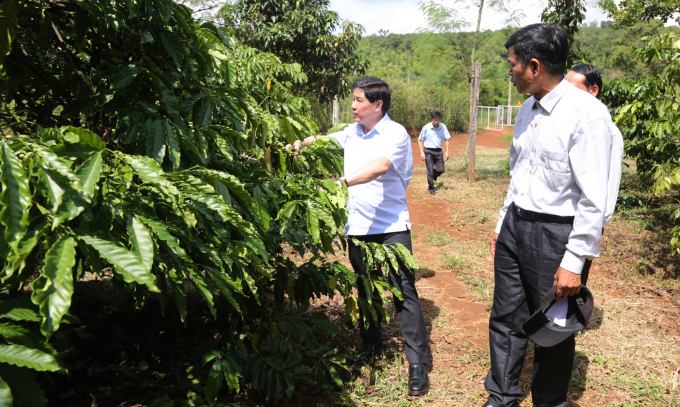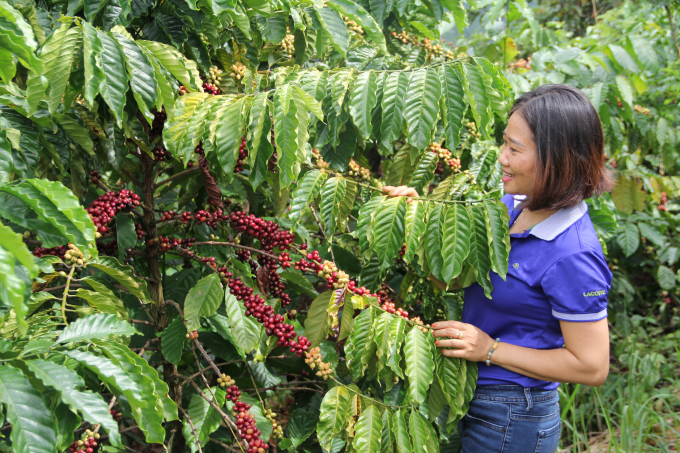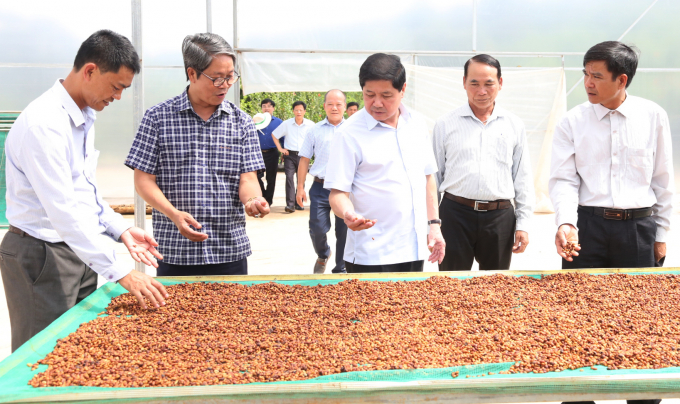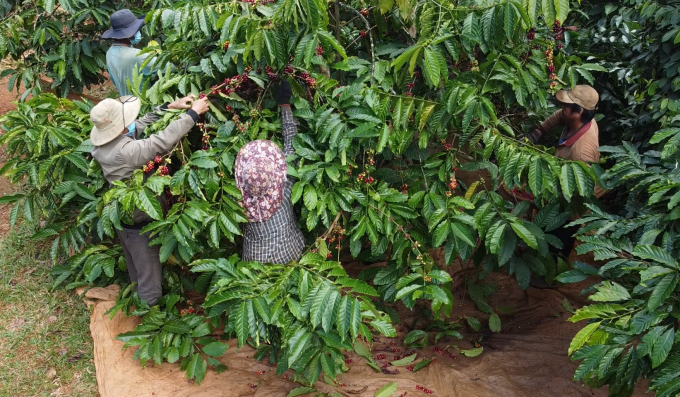May 24, 2025 | 10:30 GMT +7
May 24, 2025 | 10:30 GMT +7
Hotline: 0913.378.918
May 24, 2025 | 10:30 GMT +7
Hotline: 0913.378.918
According to the statistics of the Department of Crop Production, 129,000 hectares of old coffee trees in the Central Highlands region were replaced with new ones or grafted with young sprouts during the 2014-2022 period, reaching 107.5% of the plan. Cumulatively, the area of replanted and grafted coffee trees reached 166,579 hectares in the 2011-2021 period.
By introducing new varieties in cultivation, coffee trees grew and developed well and yielded good results. The new coffee varieties brought better quality and higher productivity, and thus economy efficiency was improved significantly, thereby contributing to sustainable coffee development.
Deputy Head of the Department of Crop Production Le Van Duc said the coffee replanting project brought good results through rejuvenating old, susceptible-to-disease and low-yielding coffee plantations. Replanted coffee plantations yielded 2.9 tons per ha on average, 0.1tons above the plan.

Deputy Minister of the MARD Le Quoc Doanh (left) visits a replanted coffee plantation supported by VnSAT project. Photo: Minh Quy.
Under the coffee replanting project, new high-yielding coffee varieties including TR4, TR9, TR11, TR13, TRS1 were introduced to farmers. They are not only of good quality but also well-resistant to coffee rust.
Typically, coffee berries of some varieties like TR4, TR15, vine coffee and short green coffee (TS5) are ripe later, normally from January to February when the Central Highlands region enters dry season and it's convenient for farmers to harvest and process coffee.
Especially, VnSAT project contributed to the success of the replanting coffee project for the 2014-2021 period. "The VnSAT supported the set-up of thousands of training courses on sustainable coffee farming techniques and replanting practices; setting up demonstration models to serve the courses; establishing dozens of nurseries, installing water-saving systems for coffee plantations; strengthening farmers' organizations and cooperatives. In particular, the project provided loans to farmers so that they could replace old coffee trees by planting new ones or grafting with young sprouts to improve yield," Duc said.
Deputy Director of the VnSAT Management Board, Cao Thanh Son said six years since the coffee-replanting project was implemented, it achieved many positive outcomes and promoted investment efficiency.
In essence, the project trained 30,898 households on coffee replanting techniques (reaching 343% of the plan) and farmers used the knowledge that they learned to replant 29,899 hectares of coffee (reaching 289% of the plan).
With the aim of providing qualified seeds for replanting 10,000 hectares of coffee as planned, a part of the project's budget was spent on the application for certification and upgrading state-owned nurseries, elite nurseries and 57 private ones.
The VnSAT program so far has issued certificates for 51 private nurseries that are qualified for participating in the project including 16 in Dak Lak, 9 in Dak Nong, 11 in Lam Dong, 12 in Gia Lai and 3 in Kon Tum; helping upgrade 11 state-owned nurseries and 21 private ones. The upgraded nurseries commercialized over 12,6 million high-quality seedlings qualified for replanting 12,000 hectares of coffee.

The coffee replanting project helps increase coffee productivity and quality in the Central Highlands region. Photo: Minh Hau.
With active support from the project, 18,283 hectares of old coffee trees in the project area have been replanted so far, reaching 183% of the plan in which Dak Lak is the locality with the largest area of replanted coffee trees, 6,215 hectares, reaching 208% of the plan.
"Thanks to technical training courses and high-quality coffee seedlings, coffee plantations under the coffee-replanting project grow well, and they are also less susceptible to diseases and pests. Successful rate is 95%," said Cao Thanh Son.
Also according to Son, to help coffee growers gain access to the source of capital for replanting their old coffee trees, VnSAT project allocated US$54.6 million to provide them long-term loans. The maximum loan limit is VND400 million per hectare within 9 year maximum. Coffee farmers enjoy preferential interest rate of 6.5% during 3-year grace period to invest in basic construction of their farms. So far, 11,922 hectares of coffee have been replanted with the loans totaling VND2,002 billion from VnSAT project
"The borrowers must meet the criteria set by the project such as attending technical training courses, using seedlings from nurseries certificated by VnSAT project. These requirements help ensure the quality of the project. Up to now, it can be said that VnSAT project plays an important role to the success of the coffee-replanting project in the 2014-2022 period," Son stated.
Deputy Minister of the MARD, Le Quoc Doanh said the coffee-replanting project brought major changes to Vietnam's coffee industry. Remarkably, Vietnam's coffee yield and production have increased constantly since 2011. Particularly, in 2011 Vietnam's coffee yield and production were 23.5 quintal/ha and 1,27 million tons respectively but in 2021 the yield and production increased to 28.2 quintals/ha and 1.81 million tons.
According to Deputy Minister Le Quoc Doanh, the project's results were extremely encouraging thanks to effective leadership of the relevant ministries and state agencies along with the engagement of the State Bank, local governments, VnSAT project as well as the cooperation of the Vietnam Coffee- Cocoa Association with coffee growers and enterprises.

Deputy Minister Le Quoc Doanh (middle) said improved quality makes Vietnamese coffee more competitive in the market. Photo: Minh Quy.
Following the success of the coffee-replanting project in the 2014-2020, the Ministry of Agriculture and Rural Development (MARD) agreed to extend the project for the 2021-2025 period. In the time to come, the project will not only implemented in five provinces of the Central Highlands but also scaled up to other coffee-producing provinces such as Son La, Dien Bien, Quang Tri, Binh Phuoc, Dong Nai and Ba Ria - Vung Tau.
To make the coffee replanting project for the 2021-2025 period successful , Deputy Minister Le Quoc Doanh asked local authorities to continue to check , screen , classify and determine the area of old coffee trees to make plans on yearly basis for replanting or grafting, depending on the situation of each province.
In addition, local authorities should pay more attention to selecting, recognizing elite trees and nurseries to quickly introduce new varieties in replanting process.
The specialized agencies under the MARD should continue to develop the process for replanting coffee, especially for replanting Arabica coffee in Son La, Dien Bien and Quang Tri provinces.
Deputy Minister Le Quoc Doanh appointed the Western Highlands Agriculture & Forestry Science Institute (WASI) to continue to do research and test new varieties, especially Arabica coffee varieties to introduce them in cultivation in the Central and Northwest regions.

Replanting program helps change the face of Vietnam's coffee industry. Photo: Minh Hau.
At the same time, businesses, associations and international organizations need to work with the specialized agencies of the MARD and localities to design technical books, organize training classes on coffee replanting to provide direct support to growers during the replanting process.
The State Bank and commercial banks should continue to give preferential loans and simplify administrative processes to help farmers easily access to the loans for replanting coffee.
For the 2021-2025 period, the MARD aims at replacing 107,000 hectares of old coffee trees by replanting new ones or grafting old ones with young sprouts, reaching average coffee yield of 3.5 tons/ha and increasing coffee growers' income by 1.5-2 times compared to before replanting project.
Translated by Mai Tham

(VAN) The People's Committee of Tra Vinh province has approved an adjustment to the investment policy for the Green Hydrogen Plant project, increasing its area to approximately 52.76 hectares.
![Reducing emissions from rice fields: [2] Farmers’ commitment to the soil](https://t.ex-cdn.com/nongnghiepmoitruong.vn/608w/files/news/2025/05/05/dsc08881jpg-nongnghiep-140632.jpg)
(VAN) Clean rice cultivation model in Thuong Tan commune, Bac Tan Uyen district, is assisting local residents in achieving sustainable agriculture by substantially reducing costs, increasing productivity, and protecting the environment.

(VAN) At the conference to disseminate Resolution No. 68, AgriS introduced its digital agricultural ecosystem and reaffirmed its commitment to accompanying the Government in promoting private sector development and sustainable agriculture.

(VAN) 'Blue Ocean - Blue Foods' initiative is designed to restore marine ecosystems and establish sustainable livelihoods for local communities by cultivating a minimum of 1,000 hectares of cottonii seaweed in the first three years.
/2025/05/21/4642-3-112707_603.jpg)
(VAN) The V-SCOPE project has made direct contributions to three out of six pillars of the Comprehensive Strategic Partnership between Vietnam and Australia.

(VAN) Facing the threat of rabies spreading to the community, Gia Lai province urgently carries out measures to vaccinate dogs and cats on a large scale.

(VAN) Disease-free livestock farming not only protects livestock herds but also stabilizes production and livelihoods for many farmers in Tuyen Quang.